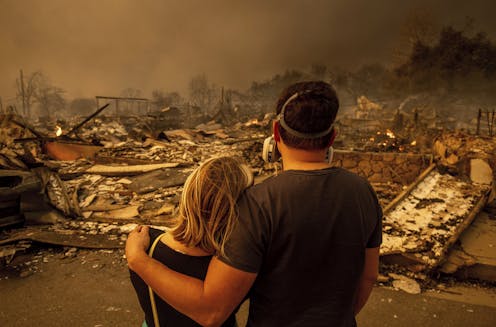A new president will be elected − but it may take some time to determine who wins
- Written by John M. Murphy, Professor of Communication, University of Illinois at Urbana-Champaign

For more than 100 years, media of many kinds tried to be the first to report presidential election results[1]. Although that urge still exists, pundits and analysts are now more concerned with accuracy than speed.
That’s because of the 2020 election. A raging pandemic[2], a divided country, a close race[3], polling failures[4], false presidential claims of voter fraud[5] and uncertainty made everyone anxious. Then came the Jan. 6, 2021, attack on the U.S. Capitol[6], which meant the election was about more than the presidency – it was about democracy itself.
What’s most important now is not being first but rather being right. In recent decades, Americans have gotten used to media organizations declaring the winners of races in the hours or days after the polls close, but those are not official results. They are projections based on the available unofficial information[7]. The formal results of the election are checked and certified through a process that takes weeks to months – and potentially longer, if lawsuits are filed.
A wrong call could spark violence, particularly because Donald Trump has yet to say that he will accept the results[8] of the 2024 election if he loses.
Media figures and election officials are preparing Americans for the fact that we might have to wait some time to get an accurate call. As in 2020, they’re using metaphor to shape public expectations. But this year, they’re also explicitly trying to define the nation’s perceptions of time, in terms of which results count as on time or as delayed.
Don’t get confused by mirages
A metaphor is a linguistic device that describes something in terms of something else, usually to highlight an important idea. If we see a football team as the Bears, we know they’re not literally animals, but they are ferocious. As a scholar[10] of presidential rhetoric and political campaigns, I know it’s important to notice metaphors because they often shape public perceptions.
As members of the media prepare themselves and the public for an uncertain election night, they’re worried that Americans will be misled by false or incomplete information[11] in the early returns. Fredreka Schouten and Sara Murray of CNN Politics write, “Election officials worry that delays[12] in counting could give the public a false sense of who’s winning the election.” The Republican Pennsylvania secretary of state adds, “It’s obviously a concern.” And so, as they did in 2020[13], they’re again using the metaphor of “mirage.”
A mirage is an optical illusion, something that looks real but is not. Old adventure movies would show a mirage of water in a desert. Lost explorers with empty canteens would run excitedly toward a sparkling oasis, only to find nothing but sand.
In 2020, no one was quite sure whether the early results would show a red or a blue mirage and so they suggested it could vary by state. For example, some states, such as Florida and Arizona, counted mail ballots as they arrived, even before Election Day. In those states, Vox reported, the early “results might look overwhelmingly favorable[14] to Joe Biden and other Democratic candidates.”
In 2024, the overwhelming expectation is that early returns in this year’s key states will look better for Republicans. Reporter Nick Corasaniti of The New York Times wrote that “Democratic operatives” have come to expect “‘the red mirage[15],’ the result of far more Democrats than Republicans opting to vote by mail, leading to Democratic votes being counted later.” The editorial board of The Washington Post fretted in September 2024 that Trump “used this so-called red mirage[16] in 2020 to declare victory and insist that the counting stop.” The implication was clear: a fear he might do so again.
People tend to see what they want to see. Those lost explorers want and need water, much as Trump yearns for victory. And mirages are partly self-deception. Partisans want that beautiful picture of triumph, blue or red seas cascading across screens on election night. These feelings explain why the mirage metaphor works well for the media: It signals that campaigns and the public see what they hope for, not what’s there. Wait, the metaphor tells us. Wait until we know it’s real.
A wait doesn’t mean it’s late
To make the waiting easier, the media has also explicitly tried to shape the public’s perceptions of time. This is not a new idea: The ancient Greeks used the term “kairos[18]” to talk about timing in public speech – when we should speak, how we define time in that speech, and what sorts of times we live in.
For example, an NBC report catalogs changes various states have made since 2020 to speed up the counting, but nonetheless notes “in the event of a close race[19], a handful of key battleground states could keep Americans waiting well beyond Election Day.” In early October 2024, Arizona’s secretary of state told a group at Harvard the results would take “thirteen days[20] and we’re not doing it any sooner because we’re going to get it right.”
At that same Harvard meeting, Pennsylvania Secretary of State Al Schmidt disputed the concept that taking time to count votes constituted a “delay.”
“It’s not a delay at all[21]. It takes time to count millions of votes, with integrity, especially when you can only start at 7 a.m. on election morning,” Schmidt said.
Taken together, the two persuasive strategies urge patience. A mirage will appear, but it is false, alluring and dangerous. It does not reflect reality. Reality will come in time, the proper time, in its season. This isn’t a delay, because it takes time to get things right. This election poses enough dangers, these officials and the media believe. All Americans need to take – or give – the time to get the count right.
Some of the material in this article was previously published on Nov. 3, 2020[22].
References
- ^ tried to be the first to report presidential election results (theconversation.com)
- ^ raging pandemic (www.pewresearch.org)
- ^ close race (www.cnn.com)
- ^ polling failures (theconversation.com)
- ^ false presidential claims of voter fraud (campaignlegal.org)
- ^ attack on the U.S. Capitol (theconversation.com)
- ^ projections based on the available unofficial information (www.ap.org)
- ^ accept the results (www.washingtonpost.com)
- ^ simon's photo/Moment via Getty Images (www.gettyimages.com)
- ^ As a scholar (communication.illinois.edu)
- ^ misled by false or incomplete information (thehill.com)
- ^ Election officials worry that delays (www.cnn.com)
- ^ as they did in 2020 (theconversation.com)
- ^ results might look overwhelmingly favorable (www.vox.com)
- ^ the red mirage (www.nytimes.com)
- ^ used this so-called red mirage (www.washingtonpost.com)
- ^ fcafotodigital/E+ via Getty Images (www.gettyimages.com)
- ^ kairos (www.merriam-webster.com)
- ^ in the event of a close race (www.nbcnews.com)
- ^ thirteen days (www.bostonherald.com)
- ^ It’s not a delay at all (www.bostonherald.com)
- ^ Nov. 3, 2020 (theconversation.com)
Authors: John M. Murphy, Professor of Communication, University of Illinois at Urbana-Champaign




